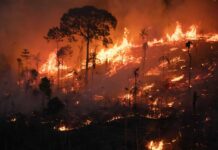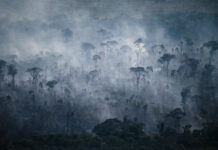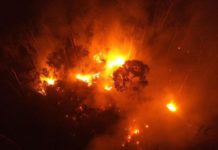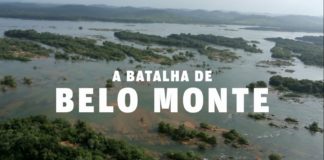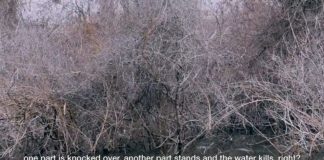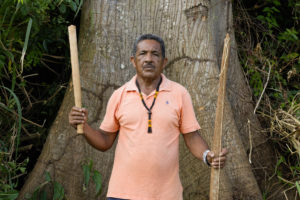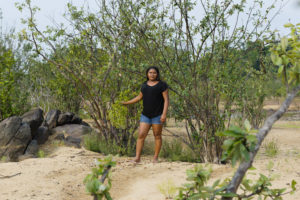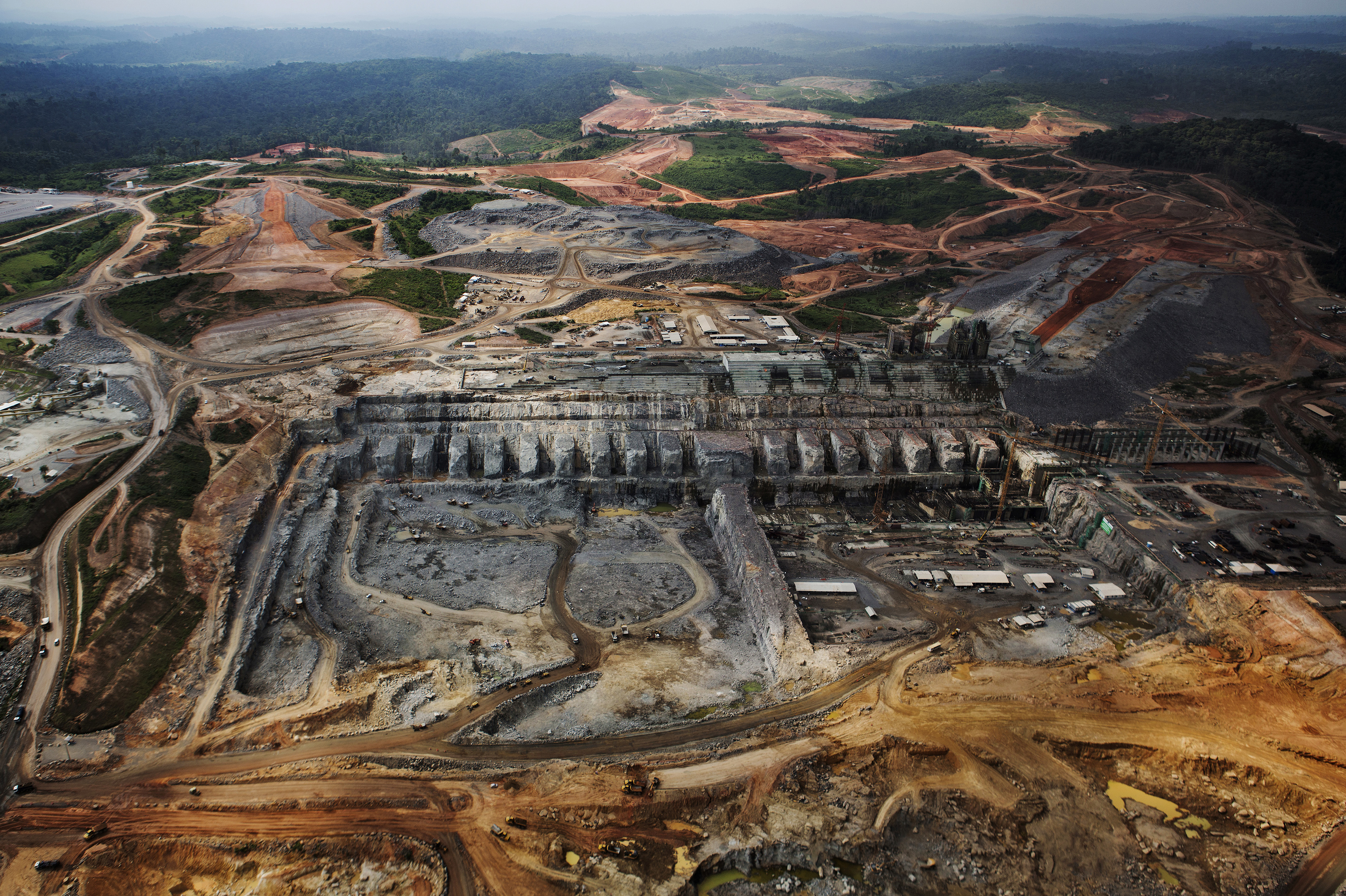
ESPECIAL BELO MONTE
The Belo Monte dam under construction, revealing the devastation of the river valley and surrounding forest. © Lalo de Almeida
VOLA 6-1
Leonardo Batista, aka Aronor, Brazil. © Leonardo Batista and Marilene Cardoso Ribeiro 2016
VOLA 6-2
Belo Monte area, Brazil. Map by International Rivers, adapted by Marilene Cardoso Ribeiro
VOLA 6-4
Maria Eliete Felix Juruna, Brazil. © Maria Eliete Felix Juruna and Marilene Cardoso Ribeiro 2016
VOLA 6-5
Maria Eliete’s son walks on a stretch of the Xingu that would usually have been in flood in the season the photo was taken. Paquiçamba village, Paquiçamba Indigenous Reserve, Brazil. © Marilene Cardoso Ribeiro 2016
6. The hydroelectric threat to the Amazon basin
Abstract
For decades hydroelectric power was seen as the solution to Latin America’s energy needs. However, serious questions have arisen over its long-term viability. Ecologists warn of the potentially catastrophic impact of dams on the Amazon basin, the most complex network of river channels in the world.
Dams have also had hugely damaging impacts on indigenous and riverine communities. Moreover, major hydro projects have been plagued by massive corruption.
Index
News related to this chapter
Hope for Amazon river dolphin?
A moratorium on fishing the piracatinga catfish in the Brazilian Amazon was extended for the third time since its introduction in 2014. There’s now no expiry date for the ban, although the ministries of environment and fishing have a period of three years to reevaluate it.
The moratorium was instituted to protect the pink river dolphin (Inia geoffrensis), known locally as the boto.
Brazil: Sumaúma – the year in images
On the one-year anniversary of Amazon-centred news community, Sumaúma, co-founder Jonathan Watts shares some of his favourite images from a year of enormous – and mostly positive change
The Amazon Summit: some progress; contradictions remain
The Amazon Summit in Belém, Brazil, brought together 8 out of the 9 countries of the Amazon Basin. There were agreements, calls for western countries to share the burden of conserving the forest. But no explicit target on halting deforestation and no willingness to halt oil extraction.
The Amazon: is this the Third World War?
What is happening in the Amazon is a war -- against the rainforest, its original inhabitants, and also against the rest of the world. Perhaps this is the Third World War, the war to end all wars?
The Amazon: Learning for a different future
A webinar about ways of teaching nad learning about the future of the Amazon, held in the Cabelo Seco community, Marabá, Pará, Brazil
Videos
Belo Monte dam: conflict in the Amazon
The Belo Monte dam, now under construction in the Amazon, is heralded as an abundant power source for Brazil’s burgeoning economy. But critics...
The Battle of Belo Monte
On 12 January 2014, TV Folha broadcast a special programme 'The Battle of Belo Monte' a live reporting of the largest and most controversial...
Costs: local people speak about the impact of hydroelectric dams on...
As a response to the current investment in large hydroelectric dams as a foundation for Brazil's 'sustainable' economic growth, 'Costs' addresses the impacts...
The ashes of Belo Monte
The massive destruction of forest to make way for the Belo Monte dam and associated roads, reservoir and channels.
Video: Repórter Brasil 2015 (in Portuguese)
The impact of the Belo Monte ‘Emergency Plan’
Drawn up without any proper consultation, or local participation, the so-called Emergency Plan was used by the developers to keep Indian people well away...
Marilene Ribeiro is an award-winning photographer and ecologist whose works investigate the relationship between human beings and nature concerning contemporary issues. She holds an MSc in Ecology and Wildlife Conservation and Management from the Federal University of Minas Gerais (Brazil), and a PhD in photography from the University of Brighton (UK). Marilene’s works approach global issues seen through the lens of Brazil.
Sue Branford is a journalist who reported from Brazil for over a decade. A founding member of LAB’s editorial team, she has worked for the BBC, the Financial Times, The Guardian and The Economist. She has written five books on Latin America, mainly on Brazil. Her latest book, co-authored with Maurício Torres, is titled Amazon Besieged: by dams, soya, agribusiness and land grabbing (Practical Action Publishing and LAB 2018).
Interviewees
Leonardo Batista, aka Aronor (Ribeirinho Council): interviewed in Altamira, Pará, Brazil, on 14 October 2016 by Marilene Cardoso Ribeiro. Transcribed by Karina Ribeiro and translated by Paula Coppio, Edgar Refinetti, and Diego Satyro.
Maria Eliete Felix Juruna (Paquiçamba Indigenous Reserve): interviewed in Paquiçamba, Pará, Brazil, on 6 November 2016 by Marilene Cardoso Ribeiro. Transcribed by Karina Ribeiro and translated by Chris Whitehouse.
Antônia Melo (Movimento Xingu Vivo para Sempre): interviewed in Altamira, Pará, Brazil, in early September 2015 by Eliane Brum. Translated by Hugo Moss.
Maria Rosa Pessoa Piedade (ribeirinha at Palhau): interviewed in Altamira, Pará, Brazil, on 2 November 2016 by Marilene Cardoso Ribeiro. Transcribed by Karina Ribeiro and translated by Alistair Clark.
References
Aleixo, J. and Condé, N. (2015) Quem são os proprietários das hidrelétricas da Amazônia?, Instituto Mais Democracia, Rio de Janeiro.
Branford, S. (2016) ‘BNDES has long history of loans to gigantic construction companies’ Mongabay, 14 March
Branford, S. (2018) ‘Brazil announces end to Amazon mega-dam building policy’, Mongabay, 3 January
Brum, E. (2015) ‘O dia em que a casa foi expulsa de casa’, El País, 14 September
Fearnside, P.M. (2015) Hidrelétricas na Amazônia – impactos ambientais e sociais na tomada de decisões sobre grandes obras, 2 vols, Editora do INPA, Manaus.
Fearnside, P.M. (2017) ‘Brazil’s Belo Monte dam: lessons of an Amazonian resource struggle’, in McCoy (ed.), Die Erde Special Issue, ‘Resource Geographies: New Perspectives from South America’
FGV (2016) Indicadores de Belo Monte – um diálogo entre condicionantes do licencia-mento ambiental e o desenvolvimento local, Câmara Técnica de Monitoramento das Condicionantes da UHE Belo Monte (CT-05), Fundação Getúlio Vargas and Centro de Estudos em Sustentabilidade (FGV-EAESP), Rio de Janeiro.
Harari, I. (2018) ‘Ribeirinhos atingidos por Belo Monte exigem retomar seu território’, Amazônia, 14 February
Hurwitz, Z., Millikan, B., Monteiro, T. and Widmer, R. (2011) Mega projeto, mega riscos – análise de riscos para investidores no Complexo Hidrelétrico Belo Monte, Amigos da Terra – Amazônia Brasileira and International Rivers, São Paulo
Instituto de Enghenaria (2010), ‘Crítica ao Aproveitamento Hidrelétrico Belo Monte’, Opinião, Jornal do Instituto de Enghenaria, Brasil, No.59, July
ISA (Instituto Socioambiental) (2016) Belo Monte: um legado de violações
Latrubesse, E.M., Arima, E.Y., Dunne, T., Park, E., Baker, V.R., d’Horta, F.M., Wight, C., Wittmann, F., Zuanon, J., Baker, P.A., Ribas, C.C., Norgaard, R.B., Filizola, N., Ansar, A., Flyvbjerg, B. and Stevaux, J.C. (2017) ‘Damming the rivers of the Amazon basin’, Nature 546(7658), 363–9.
Little, P. E. (2014) Mega-Development Projects in Amazonia: A Geopolitical and Socioenvironmental Primer, Red Jurídica Amazónica (RAMA), Derecho, Ambiente y Recursos Naturales (DAR), and Articulación Regional Amazónica (ARA), Lima.
MediaLivre (2011) ‘Belo Monte derruba presidente do Ibama pela II vez’, YouTube video, 14 January
MPF (Ministério Público Federal) (2013) ‘Ação civil pública no. 0000655-78.2013.4.01.3903’, issued on 19 April 2013.
MPF (2014) Plano Emergencial UHE Belo Monte, video directed by Marco Paulo Fróes Schettino, MPF, Altamira /Pará
MPF (2015) ‘Ação civil pública no. 3017-82.2015.4.01.3903’, issued on 10 December 2015.
Pérez, M.S. (2015) ‘Where the Xingu bends and will soon break’, American Scientist, November/December, 395–403
Pontes, F. (2011) ‘Belo Monte de violências’. Piseagrama 2, 16–20
Ribeiro, M.C. (2018) ‘Dead water – a photography-based inquiry into the impact of dams in Brazil’, University for the Creative Arts, Farnham [PhD thesis], slideshow
Santos, S.M.S.B.M. and Hernández, F.M. (organizers) (2009) Painel de especialistas – Análise crítica do estudo de impacto ambiental do aproveitamento hidrelétrico de Belo Monte, 29 October, Fundação Viver, Produzir e Preservar (FVPP) de Altamira, ISA, International Rivers Network (IRN), WWF, FASE, Rede de Justiça Ambiental, Belém
Sevá Filho, A.O. (2005) Tenotã-Mõ – alertas sobre as consequências dos projetos hidrelétricos no rio Xingu, IRN, São Paulo.
Sullivan, Z. (2016) ‘Brazil’s dispossessed: Belo Monte dam ruinous for indigenous cultures’, Mongabay, 8 December
Further reading
Anderson, M. and Elkaim, A.V. (2018) ‘Belo Monte legacy: harm from Amazon dam didn’t end with construction (photo story)’, Mongabay
Assahira, C; Piedade, M. T. F; Trumbore, S. E; Wittmann, F; Cintra, B. B. L.; Batista, E. S.; Resende, A. F. and Schöngart (2017) ‘Tree mortality of a flood-adapted species in response of hydrographic changes caused by an Amazonian river dam.’ Forest Ecology and Management, 396, pp. 113–123.
Baird, V. (2011) ‘Peru’s dam busters’, New Internationalist
Barros, C. and Barcelos, I. (2017) ‘Battling a tide of sewage in Brazil: ‘For 17 days we lived with our feet under water’, The Guardian
BBC News (2017) ‘Amazon culture clash over Brazil’s dams’, BBC News
Benchimol, M. and Peres, C. A. (2015) ‘Widespread Forest Vertebrate Extinctions Induced by a Mega Hydroelectric Dam in Lowland Amazonia’, in PLoS ONE, 10 (7): e0129818
Branford, S. (2016) ‘Report from the Amazon: Altamira, a City Transformed by the Belo Monte Dam’, Amazon Watch
Branford, S. (2016) ‘BNDES funded Belo Monte dam — a mega-project with mega-problems’, Mongabay
Claret, A. (2013) Chegou o inv(f)erno. São Paulo, Outras Expressões (priest Antônio Claret’s essays on the local effects of the Belo Monte dam project (in Portuguese)
Friedman, U. (2014) ‘The Woman Who Breaks Mega-Dams’, The Atlantic
Fundação Getúlio Vargas (2015) ‘Indicadores de Belo Monte’, (project monitoring to what extent Belo Monte has satisfied the conditions of its environmental licence, as well as effectiveness of related public policy, in Portuguese)
Fundación Proteger, International Rivers and ECOA (n.d.) ‘Dams in Amazonia’, (interactive website that provides data on dam projects within the Amazon region)
Hill, D. (2015) ‘Peru planning to dam Amazon’s main source and displace 1000s’, The Guardian
Hill, D. (2015) ‘Peru’s mega-dam projects threaten Amazon River source and ecosystem collapse’, Mongabay
International Rivers (2012) ‘Belo Monte: Massive dam project strikes at the heart of the Amazon’, International Rivers
Lees, A.C.; Peres, C. A.; Fearnside, P. M.; Schneider, M. and Zuanon, J. A. S. (2016) ‘Hydropower and the future of Amazonian biodiversity’, in Biodiversity Conservation, 25, pp. 451–466.
Moraes, M. and Pimentel, S. (2013) Amazônia Pública, São Paulo, Pública, 1st ed (in Portuguese)
Nilsson, C.; Reidy, C. A.; Dynesius, M. and Revenga, C. (2005) ‘Fragmentation and flow regulation of the world’s large river systems’, in: Science, 308, pp. 405–408
Poirier, C. (2017) ‘Xingu River Defender Antônia Melo Honored for Her Lifelong Struggle’, Amazon Watch
Poirier, C. (2017) ‘Victory for Indigenous Rights in Brazil as Court Revokes License for the Belo Sun Mine’, Amazon Watch
Pontes Jr, Felício. (n.d.) ‘Belo Monte de Violências’, (web blog by Felício Pontes Jr., a prosecutor for the State of Pará, in Portuguese)
Pskowski, M. (2016) ‘Dam opponents claim criminalization by Ecuadorian government’, Mongabay


